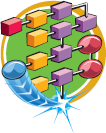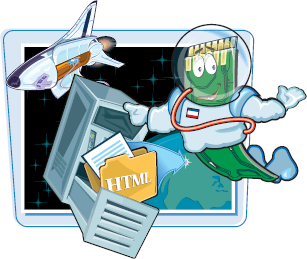
You can turn your Microsoft Office files into HTML documents that you can poston the Web. When you activate the Save As Web page command, you create a Web page file that contains all of the necessary HTML coding for it to be read by Web browsers.
Create an HTML File
Note
In Publisher, you can click File and then click the Convert to Web Publication command to convert a publication to an HTML page.
The Save As dialog box appears
Note
The Save As dialog box only displays the Web page options when you activate the Save as Web Page command
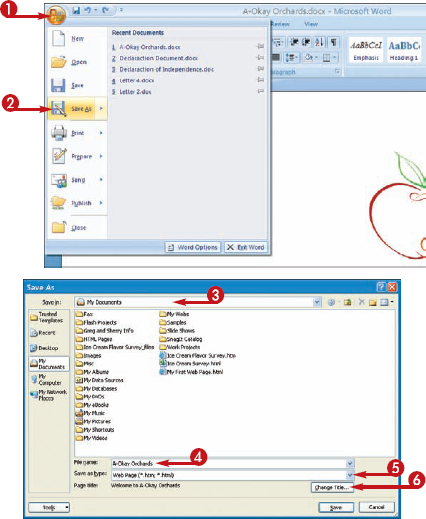
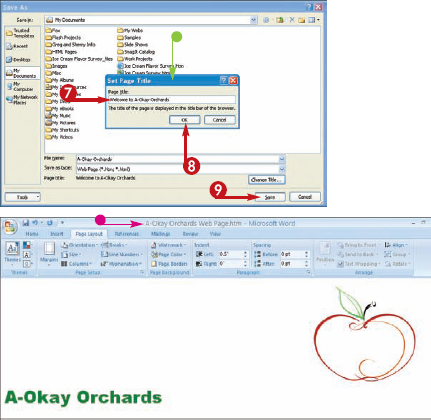
Note
What does the Publish button do?
If you are turning an Excel worksheet or PowerPoint slide into a Web page, and you are ready to publish the Web page to a server, you can click Publish in the Save As dialog box to open the Publish as Web Page dialog box. You can then use the Publish as Web Page dialog box to add spreadsheet functionality to the page and designate a server path and filename. When you activate the Publish command, Office publishes the page and opens it in your default browser to display theinformation.
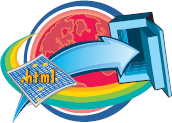
Can I assign a password to a workbook
Yes. You can assign a password from the Save As dialog box. Simply click the Tools button and click General Options. This opens the General Options dialog box. Type a password for the file and click OK. Then retype the same password again to verify it. When you save the file, the password is saved along with the workbook. You can also use the General Options dialog box to add a password that allows other users who know the password the opportunity to change the file.

You can insert hyperlinks into your files that open a Web page when a user clicks them. When linking to a Web page, you must designate a Uniform Resource Locator, or URL. This is the unique address that identifies the Web page.
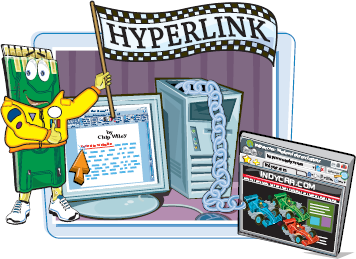
You can also use hyperlinks to link to other files on your computer. You must designate the address or path of the page that you want to link to when you add links to a file.
Add a Hyperlink
Note
In Word, click the Links buttonand then click Hyperlink.
Note
In Publisher, click the Insert Hyperlink button (
The Insert Hyperlink dialog box appears.
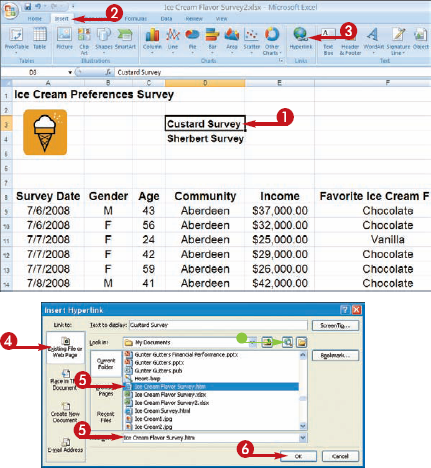
The hyperlink is created.
The
The default Web browser opens and displays the designated page
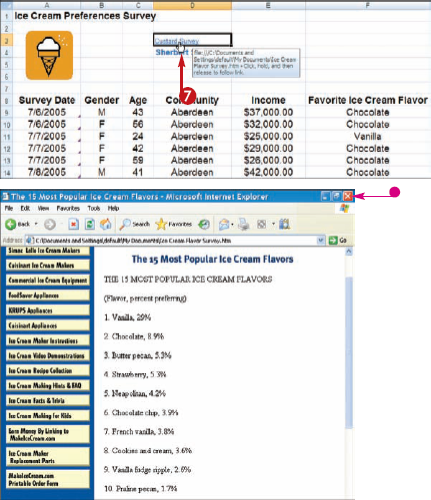
Note
How do I edit a link?
To change a link, such as editing the Web page URL, you can open the Edit Hyperlink dialog box and make any necessary changes. Right-click the link and click EditHyperlink from the shortcut menu. The Edit Hyperlink dialog box appears. You can use the dialog box to change the hyperlink text and address, or the type of page that you want to use in the link.

How do I remove a hyperlink?
You can right-click a link and click Remove Hyperlink from the shortcut menu. The associated link is removed and the original text or image remains. To remove a hyperlink from the Edit Hyperlink dialog box, you can click Remove Link

You can use AutoShapes to draw your own shapes and graphics for your documents, worksheets, slides, and publications. You can choose from a large library of predrawn shapes in the AutoShapes palette. Once you draw a shape, the Format tab displays the Drawing tools that you can use to format the shape, including tools for controlling the color and line thickness.
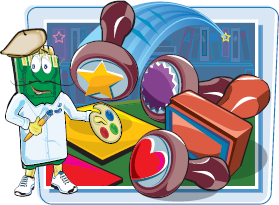
AutoShapes is just one of several features that you can find on the Insert tab on the Ribbon in Word, Excel, and PowerPoint. You can also use AutoShapes in Publisher. Graphics tools are not available in Outlook or Access.
Draw AutoShapes
Note
In Publisher, you can click the AutoShapes tool (
The full Shapes palette displays
The
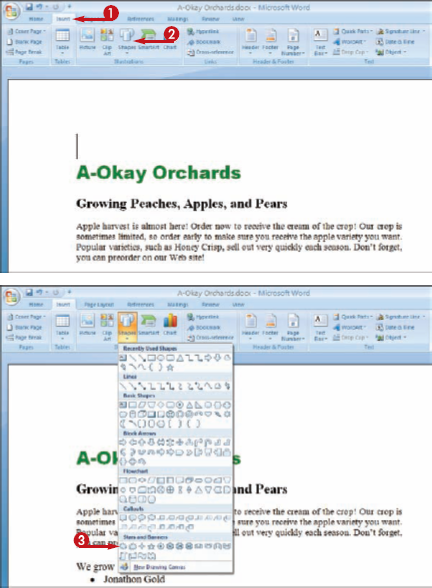
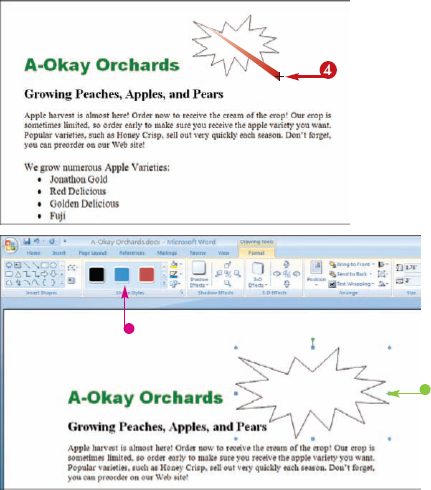
Note
You can move and resize the object or edit it with the Drawing toolbar buttons. See the "Move and Resize an Object" task to learn more
Note
You can right-click a shape and click Format AutoShape to open the Format AutoShape dialog box.
Note
How do I add text to an AutoShape
To add text to a shape, you can click the Edit Text button on the Format tab that appears on the Ribbon when you select the shape. After you type your text, you can format it with the formatting tools found on the Home tab of the Ribbon. When you activate the Edit Text tool, the AutoShape converts to a text box object.
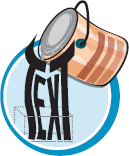
How do I remove an AutoShape
You can easily delete any AutoShape object that you add to a document. Simply click the shape to select it, and then press
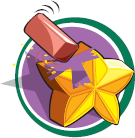
You can add interest to your Office files by inserting clip art images. Clip art is simply predrawn artwork. Word, Excel, PowerPoint, and Publisher install with the Office clip art collection. In addition, you can look for more clip art on the Web using the Clip Art task pane.
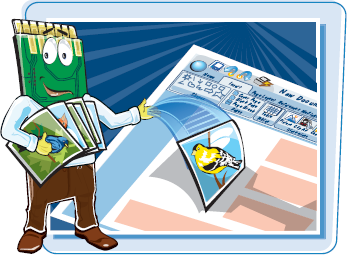
Insert Clip Art
You can also move the clip art to a different location after you insert the art.
The Clip Art task pane opens
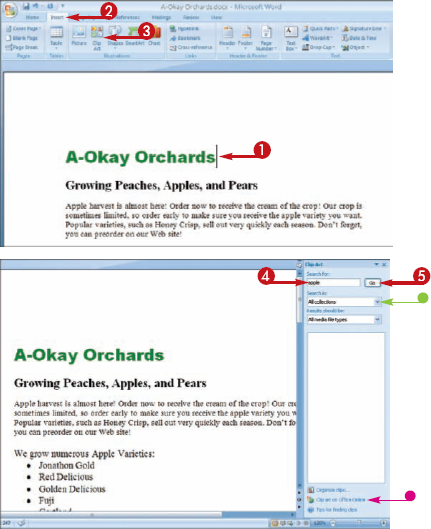
The Clip Art task pane displays any matches for the keyword or phrase that you typed
You can resize or move the clip art.
Note
See the "Move and Resize an Object" task, later in this chapter, to learn more
To deselect the clip art, you can click anywhere else in the work area.
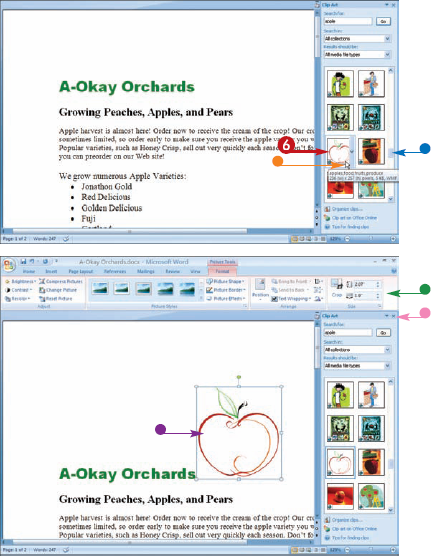
Note
How do I search for a particular type of clip art, such as a photo or sound file?
To search for a particular type of media, click the Results should be

How do I find details about the clip art?
To find out more about the clip art's properties in the Clip Art task pane, move the

You can use the Microsoft Clip Organizer to view clip art collections on your computer. You can also insert clip art from the Organizer window and place it in your Office file. The Clip Organizer does exactly as its name implies ' it organizes clip art images and entire clip art collections to suit the way you work. For example, you might place all of the clip art related to your company newsletter in one collection.
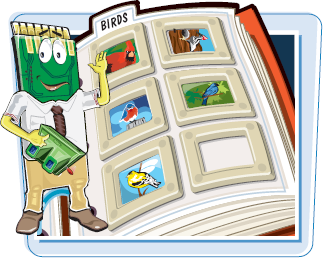
View Clip Art with the Clip Organizer
Note
See the previous task to learn how to open this pane
The Microsoft Clip Organizer window opens.
If some categories include subcategories, you can click a category
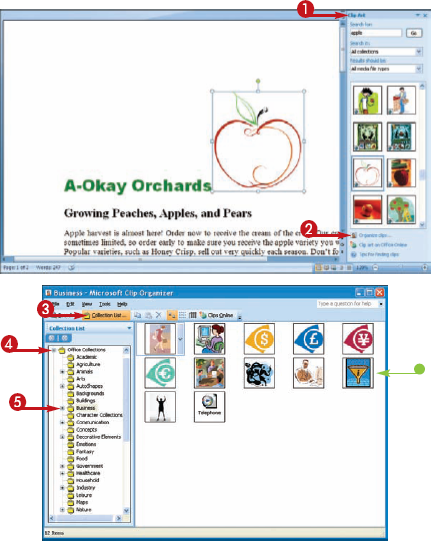
To add a clip art image to the current document, you can drag the clip art to your work area.
The Microsoft Clip Organizer window closes
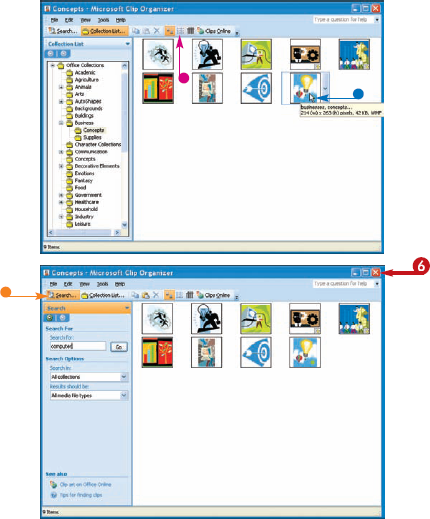
Note
How do I download clip art from the Web?
You can click the Clip art on Office Online link at the bottom of the Clip Art task pane to open your default Web browser to the Office Web site. From there, you can click a clip art category and locate the art that you want to download. Simply select the images that you want to download, click the Download link, and follow the instructions.
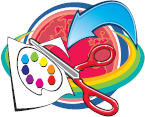
Can I copy clip art from one collection to another?
Yes. You can copy clip art from one collection and paste it into another collection using the Microsoft Clip Organizer. Simply click the clip art that you want to copy, and then use the Copy (

You can illustrate your Office files with images that you store on your computer. For example, if you have a photo or graphic file from another program that relates to your Excel data, you can insert it onto the worksheet. If you have a company logo, then you can insert it onto a Word document.
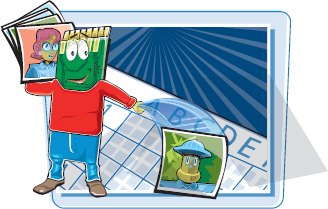
Image or picture files, also called objects in Office, come in a variety of file formats, such as GIF, JPEG or JPG, and PNG. After you insert an image, you can resize and reposition it, as well as perform other types of edits on the image.
Insert a Picture
You can also move the image to a different location after inserting it onto the page.
Note
In Publisher, click the Picture Frame button (
The Insert Picture dialog box appears
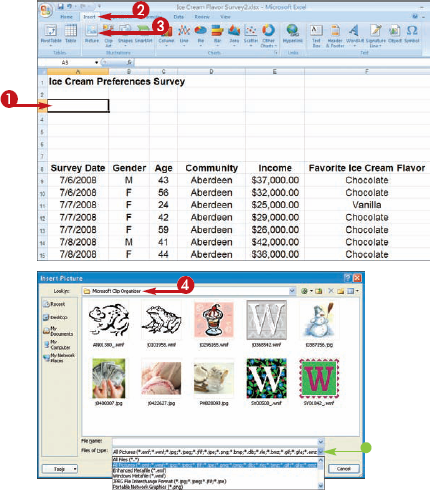
You may need to resize or reposition the picture to fit the space.
Note
See the "Move and Resize an Object" task to learn more
To remove a picture that you no longer want, you can click the picture and press
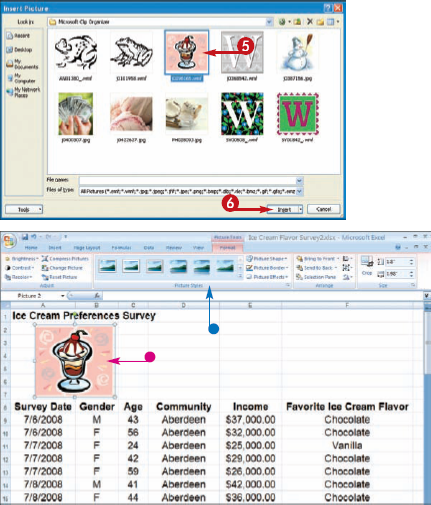
Note
If I am sharing my file with others, can I compress the pictures to save space?
Yes. You can take advantage of the new compression features available in Office 2007 to compress image files that you add to any document. Simply select the picture and display the Format tab on the Ribbon. In the Picture Tools group of commands, click the Compress Pictures button. This opens the Compress Pictures dialog box. Click the Options button to open the Compression Settings dialog box, and fine-tune any settings that you want to apply. Click OK, and then click OK again to compress the pictures.
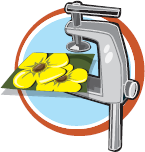
I made changes to my picture, and now I do not like the effect. How do I return the picture to the original settings?
You can click the Reset Picture button, located in the Picture Tools group on the Format tab, to restore a picture to its original state. This command removes any edits that you applied to the image. Activating this command does not restore the original size of the image.
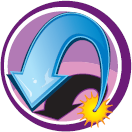
In Word, the WordArt feature works the same as in previous versions of Office. In PowerPoint and Excel, the feature works a bit differently, as shown in this task.
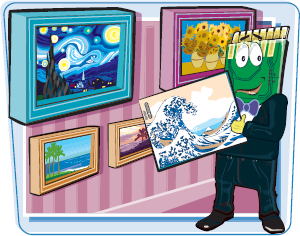
You can use the WordArt feature to turn text into interesting graphic objects to use in your Office files. For example, you can create arched text to appear over a range of data in Excel, or vertical text to appear next to a paragraph in Word. You can create text graphics that bendand twist, or display a subtle shading of color.
Insert a WordArt Object
You can also move the WordArt object to a different location after inserting it onto the page.
Note
In Word, the WordArt Gallery menu appears, and you can choose a style in the same way as in previous versions of Office
Note
In Publisher, click the Insert WordArt button (
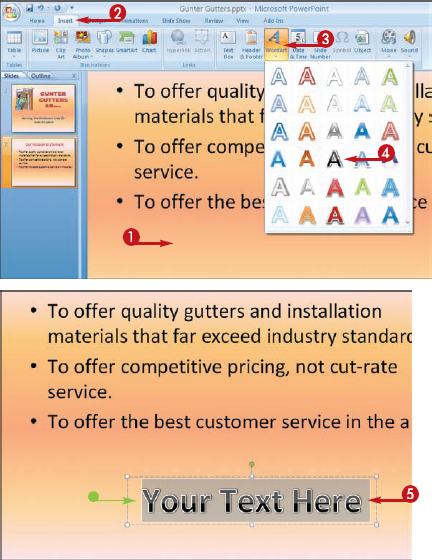
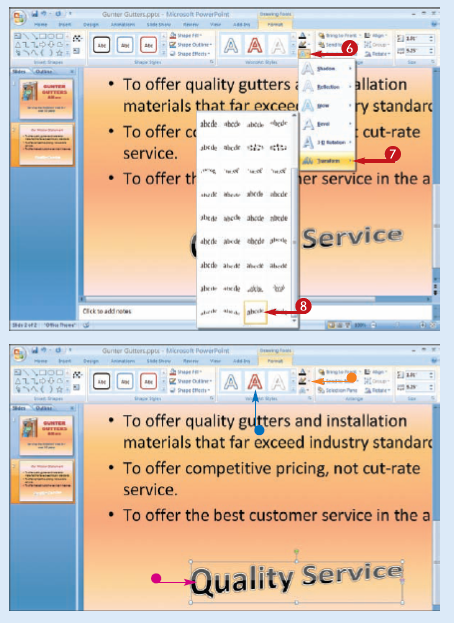
You can resize or move the image.
Note
See the next task, "Move and Resize an Object," to learn more
Note
How do I edit my WordArt text?
To edit the WordArt text, simply click the WordArt text box and select the text that you want to change. When you type your changes, the object immediately reflects the new text. To edit the appearance of the WordArt object, use the WordArt Styles tools, located on the Format menu on the Ribbon.

How do I remove a WordArt object?
To remove the object entirely, click the WordArt text box, and then press
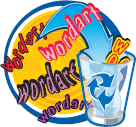
You can move and resize any clip art, image, or shape that you place in a file. Clip art, images, and shapes are also called objects in Office. When you select an object, it is surrounded by handles that you can use to resize it.
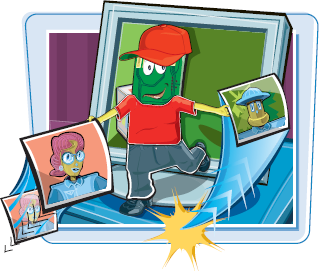
Move and Resize an Object
MOVE AN OBJECT
The
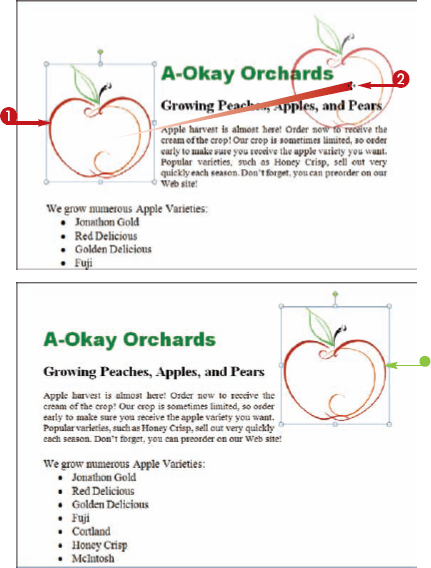
Note
When moving the object to fit with text, you may need to adjust the object's text wrapping settings. See the "Control Text Wrapping" task to learn more
RESIZE AN OBJECT
The
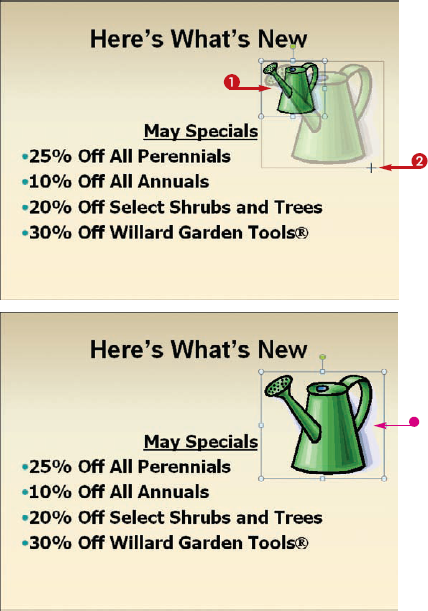
Note
Can I also use the Cut, Copy, and Paste commands to move or copy an object?
Yes. You can easily cut, copy, and paste objects around your Office files. Simply select an object and then apply the commands. You can find the commands on the Home tab on the Ribbon in Word, Excel, and PowerPoint. In Publisher, you can click
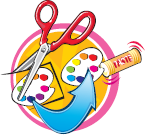
Can I resize an object and keep the scaling proportional?
Yes. To maintain an object's height-to-width ratio when resizing, press and hold

You can rotate and flip objects that you place on your documents, worksheets, slides, or publications to change the appearance of the objects. For example, you might flip a clip art image to face another direction, or rotate an arrow object to point elsewhere on the page.
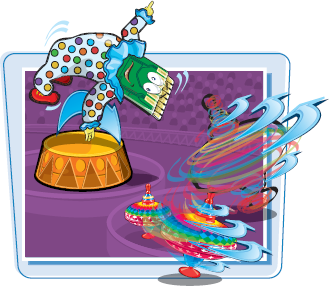
Rotate and Flip Objects
ROTATE AN OBJECT
The
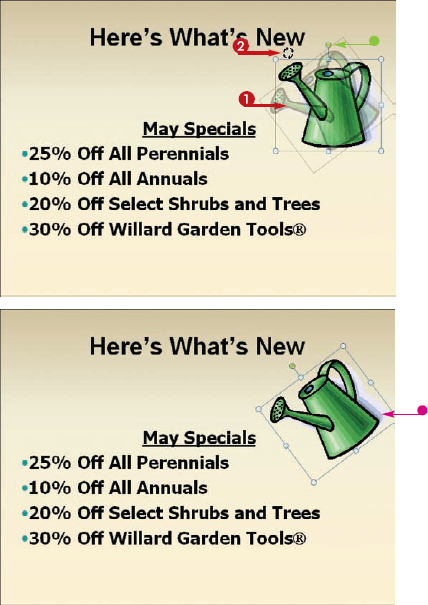
Note
You can also use the Rotate button on the Format tab on the Ribbon to rotate an object 90 degrees left or right.
FLIP AN OBJECT
Note
In Publisher, you can click the Arrange menu to find the Rotate and Flip commands.
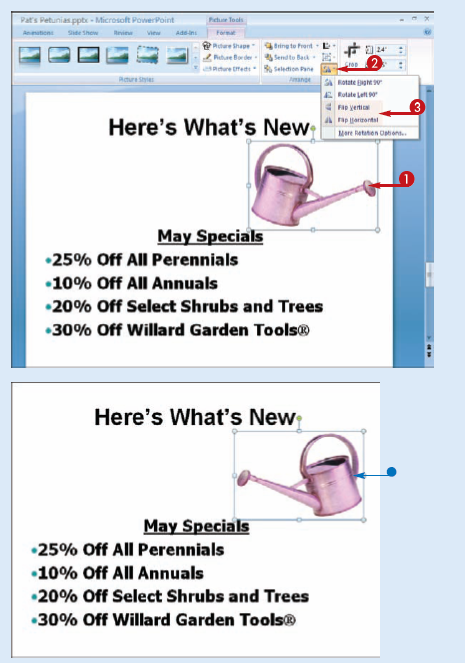
Note
How do I rotate text?
The easiest way to rotate text is to create a WordArt object to rotate. You can learn how to create a WordArt object in the "Insert a WordArt Object" task, earlier in this chapter. After you create the WordArt, you can rotate it using the steps shown in this task. You can also choose from several preset vertical text styles among the WordArt styles.

Is there a way to constrain how much rotation occurs when I drag the rotation handle?
Yes. To constrain the rotation to 15-degree angles, press and hold
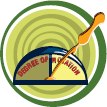

You can crop a picture that you add to any Office file to create a better fit orto focus on an important area of the image. The Crop tool, located on the Format tab, can help you crop out parts of the image that you do not need. You can also crop clip art pictures.
Crop a Picture
The Format tab opens and displays the Picture tools
Note
In Publisher, click the Crop button (
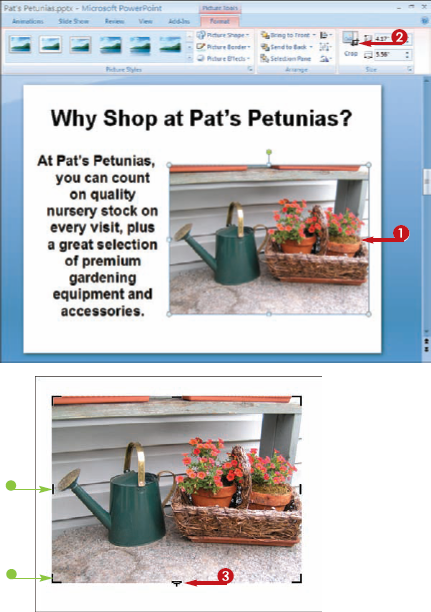
The
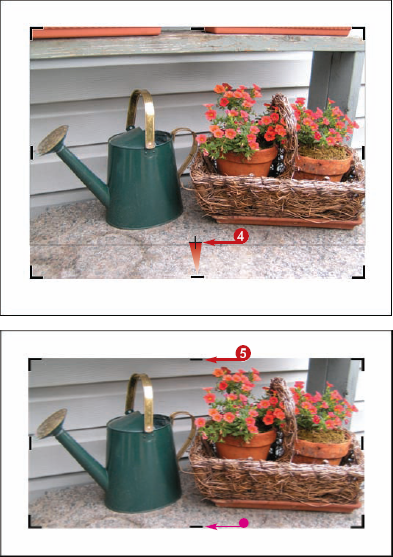
Note
See the "Move and Resize an Object" task, earlier in this chapter, to learn how to resize an image
Note
How can I reduce the overall file size of an image that I use in an Office file?
You can use the Compress Pictures tool on the Ribbon's Format tab to reduce the resolution of an image or to discard extra information from cropping the image. Click the Compress Pictures button to open the Compress Pictures dialog box, and then click the Options button to open the Compression settings dialog box, which offers several options to help you to control the overall file size of an image.

How can I return the image to its original state before cropping?
Click the Reset Picture button in the FormatPicture dialog box to reset the image to the size it appeared when you first inserted it onto your worksheet. Any cropping or other edits that you made to the image are discarded. Click the Size button, which is located in the bottom right corner of the Size command group on the Ribbon. The Size dialog box appears. Click the Reset button on the Size tab to resize the image.

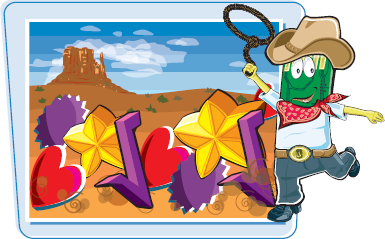
You can control the placement of objects, such as AutoShapes, in your document to create different kinds of effects. For example, you might layer two shapes on top of each other to create a logo, or you might group several shapes together in order to move them around the document more easily.
Arrange Objects
CHANGE OBJECT ORDER
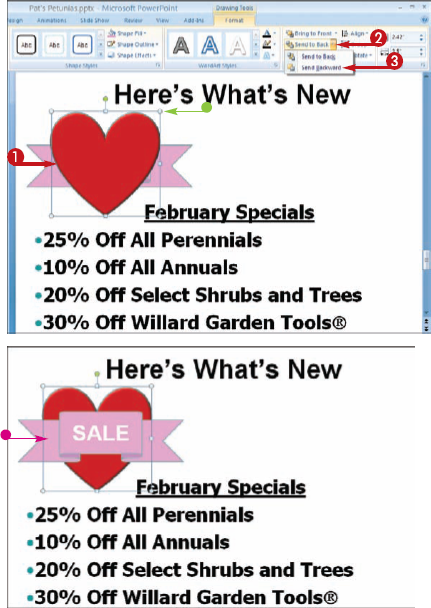
The object moves forward or backward in the layer order.
GROUP OBJECTS
You can continue clicking other objects to add to the group.
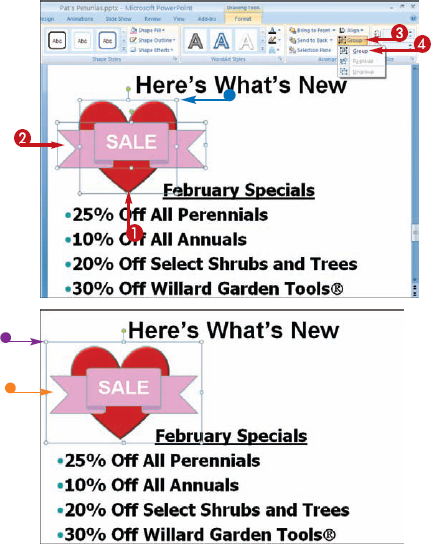
Note
You can use the Align controls in the Format tab of the Ribbon to align and distribute shapes evenly on the page. For example, you might want to line up three shapes on the left side of a document. To do so, select the first shape, and then press and hold
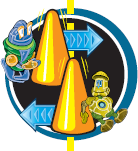
Is there another way to select and group multiple objects?
Yes. If you have several objects scattered around a page, you can drag a selection handle around them to create a group. Simply click and drag across the page to include each object in the selection rectangle. When you release the mouse button after dragging across the objects, the objects are automatically grouped for you.

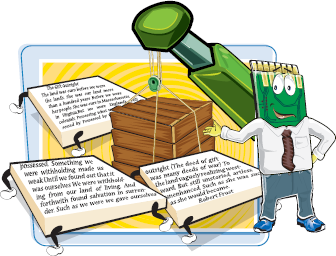
You can control the way in which your document's text wraps around any object that you place on a page. For example, you might want the text to wrap tightly around a clip art graphic, or to make the text appear to overlap a shape.
Control Text Wrapping
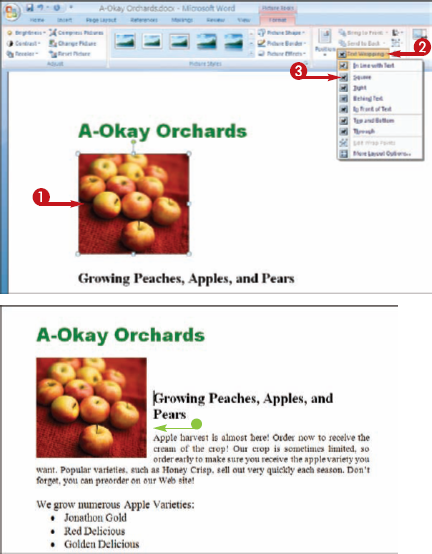
The wrap style is applied.
Note
Text wrapping is not available in PowerPoint
You can use the Recolor command to quickly recolor a clip art object or a picture. For example, you might want to choose a color that matches the other elements in your document. You can choose from several preset color modes, in light and dark variations.
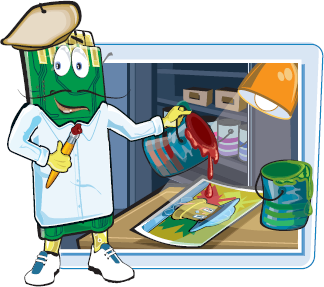
Recolor a Picture
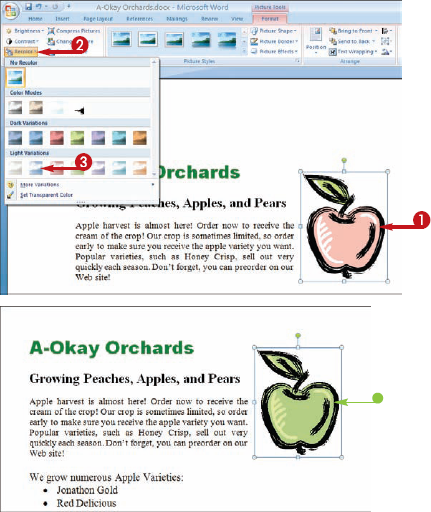
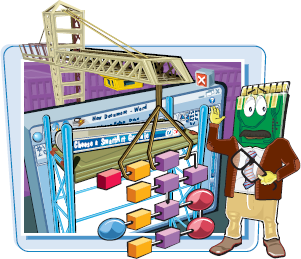
You can use the SmartArt feature to create all kinds of diagrams to illustrate concepts and processes. For example, you might insert an organizational diagram in a document to show the hierarchy in your company, or you might use a cycle diagram to show workflow in your department.
Add SmartArt
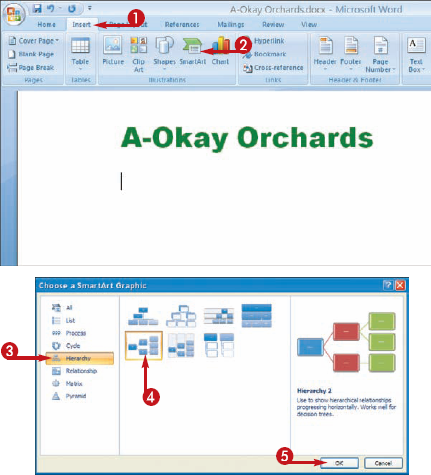
The Choose a SmartArt Graphic dialog box appears.
The diagram and placeholder text boxes appear, along with the Text pane.
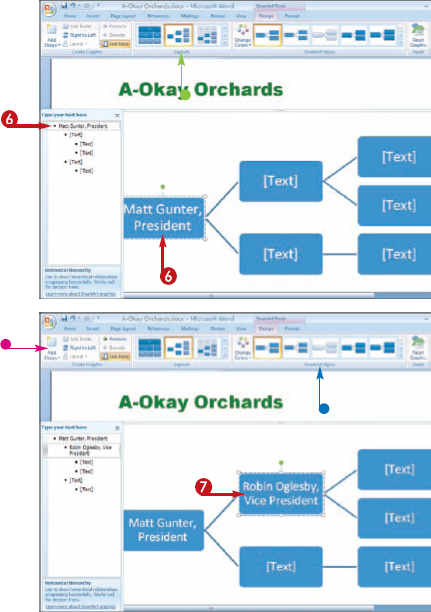
Note
Can I resize my diagram?
Yes. The diagram is an object that you can move and resize just like other objects in the Microsoft Office programs. To move or resize a diagram, see the "Move and Resize an Object" task. You can also use the control on the Diagram toolbar to change the sizing of the diagram layout, such as fitting the diagram to the contents or expanding the chart. Click Layout on the Diagram toolbar to view your options.
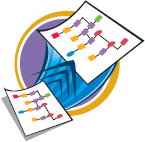
Can I change a shape's position or shape inthe diagram?
Yes. To change the position, click the shape element in the diagram, and then click the Promote or Demote button in the Create Graphic group on the Design tab. To change the shape to a new shape, first click the shape to select it, then click the Format tab and click the Change Shape button in the Shape Styles group.
